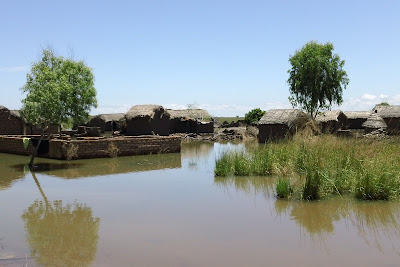 Chad - When it Rains, it Pours
Chad - When it Rains, it Pours
by Pierre Péron, Public Information Officer for the UN Office for the Coordination of Humanitarian Affairs (OCHA)
There is an expression that you will hear throughout Africa: “l’eau, c’est la vie.” Water is life. Nowhere is this more evident than in the Sahel, the strip of semi-arid land stretching East to West across the continent, marking the boundary between the Saharan desert and the rain forests of Equatorial Africa.
People in the Sahel are tough, but 2012 is proving to be an exceptionally bad year and the resilience of communities is being sorely tested. More than 18 million people in the Sahel are affected by a major food security and nutrition crisis this year, 3.6 million of them in Chad. Even though the humanitarian community rang the alarm bell early and thousands of tons of food aid have been distributed by the World Food Program, malnutrition rates have soared: UNICEF and partners in Chad have treated more than 100,000 children for severe acute malnutrition since the beginning of the year.
There are many reasons for this dreadful situation, but a major factor is that the Sahel region suffered yet another drought last year, the third in a decade. The crop yields were abysmal and people delved into their last reserves of food. These repeated shocks to the system have had a devastating impact on the ability of communities to survive. The rainy months between July and October have been the most difficult, known as the “lean months” or the “hunger season” preceding the next crop harvest. This year the rains started early and are finishing late, initially raising expectations of a better crop yield this time around.
However, the irony is that the rains bring their own problems. This year has seen the worst floods in living memory, with vast areas of the south of the country under water. More than 470,000 people have been affected, 94,000 houses have been damaged, and 34 people drowned. Just as worrying, many crops were damaged with more than 255,000 hectares of agricultural fields flooded. The bad roads and swollen rivers that criss-cross the country make it very difficult to reach these areas, so we are still not sure what will be the impact on the up-coming harvest. In the mean-time, OCHA and humanitarian partners are mobilizing to assist the most affected communities with water, sanitation, and other immediate needs.
And while there may be water all over the place right now, not much of it is clean. The lack of sanitation and the unavailability of clean water make perfect conditions for cholera, which killed more than 400 people last year in Chad. So far in 2012, there hasn’t been any cholera, but NGOs, the World Health Organisation, and the government are all prepared for it. Action plans are set and contingency stocks are in place. The humanitarian community is ready to respond to an outbreak to save lives, but since the water and sanitation budget for Chad is only 17% funded, we can hardly say that all is being done to prevent cholera from striking again.
So right now, when Chad is at its hungriest and wettest, water can be both a blessing and a curse. The level of the Chari and Logone rivers that run through the capital N’Djamena is rising every day and several neighborhoods are already flooded. A man who waded home from church knee-deep in water told a local journalist: “We prayed many times to God for him to give us rain. Now he has given it to us and although we are now under water, we must accept it rather than regret it. God answered our prayers.”




No comments:
Post a Comment